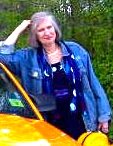 When Mary Rothschild was seven, television entered her home, and her family's life changed on a dime. “On a very visceral level, I had a very direct impression of my father turning away from us and toward the television. Even all the furniture got turned toward the television.” After having her own children, Mary investigated how television effects all of us, especially young children, a calling that led her to found Healthy Media Choices, a not-for-profit organization.
When Mary Rothschild was seven, television entered her home, and her family's life changed on a dime. “On a very visceral level, I had a very direct impression of my father turning away from us and toward the television. Even all the furniture got turned toward the television.” After having her own children, Mary investigated how television effects all of us, especially young children, a calling that led her to found Healthy Media Choices, a not-for-profit organization.She founded the organization after another pivotal moment. When she was teaching craft classes to children, one day she found herself baking bread with six or so small children all under the age of five. “We all had our little pieces of dough, which I showed them how to knead without getting their fingers sticky. It was about 45 minutes of absolute silence, everyone paying attention to their kneading, and I remember thinking, 'This is why I was born.' Th
 en this little girl looked up to me and said, 'Mary, the Lion King video is too loud.'” There wasn't any Lion King video playing, however. “I said, 'I don't see it,' and she said, 'It's in my head.' It was a moment I really felt a very strong call to really focus on what was going on with kids.”
en this little girl looked up to me and said, 'Mary, the Lion King video is too loud.'” There wasn't any Lion King video playing, however. “I said, 'I don't see it,' and she said, 'It's in my head.' It was a moment I really felt a very strong call to really focus on what was going on with kids.”From there, Mary threw herself in researching children and the media, and with other parents, meeting for potlucks, discussions, and eventually a conference on children and the media. “I began to see what was happening with the children, and how it dovetailed with the research. Even at a young age, images of media distract them.” She also attended a media literacy training in Albuquerque, N.M. and joined several media literacy organizations.

Healthy Media Choices now offers workshops for teachers, and parents (of children from birth through fourth grade) on media and children. Her weekly show, “Healthy Media Choices Hour,” airs on WVEW-1p-FM in Brattleboro, Vermont, and features long conversations with movers and shakers in the field of media literacy. She also presents talks, and consults with people on how to interact with media and find the best individual solution for their household. “Each household is an ecosystem. It's very unique unto itself.” A solution for one household might be to limit television viewing for young children to an hour a week; another family might just devote an hour each week to shutting off TVs, Blackberries, computers and other media and taking a walk, playing games or telling stories. Mary explains that even an hour a week of families interacting without screens can go a long way to offsetting the main messages of our culture that come through media, which she sums up as “You can never have enough stuff, you can never look good enough, violence is an acceptable way to solve problems....and if something is wrong, take a pill.”
Instead, families can rediscover or discover anew the power of storytelling born from their own values and experiencing instead of just watching the stories that come across the television screen. Mary suggest sharing “our story of struggle, success or failure, strength and courage in the face of difficulty....My experience is everyone is a storyteller. They just don't know it.”
Although very successful in founding Healthy Media Choices and plenty busy with the work, she decided to pursue a master's degree at Goddard to explore and learn from her own story and to expand the reach of Healthy Media Choices. “You could only go so far in my experience on vocation. I needed the interplay with professionals who could look at my work and say, have you seen this, or just evaluate what they saw. There is a phenomenon called founder's syndrome. There is something so intrinsic to my own inner life, my own vision of the world. That can have negative aspects, and it needs to be informed by a wider vision. I really found that in spades at Goddard.” During the last three semesters, she studied media literacy, ecology and culture, archetypal stories and the power of myth, and narrative theory and therapy. “Each step along the way has just broadened the lessons I can bring to my work.”
And while television can be a great way to see more of the world and get glimpses into the everyday life of other cultures, Mary values even more the glimpses of our own lives we can share with her families and community. “We have the strength to be able to joyfully take full advantage of our stories,” she explains.
Visit Mary's blog, and listen to her radio program on streaming audio or download podcasts.
You can also follow Mary on Twitter @mediachoices, and visit Healthy Media Choices on Facebook and Linkedin.


















